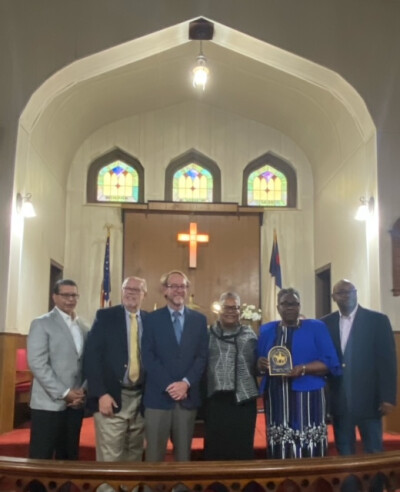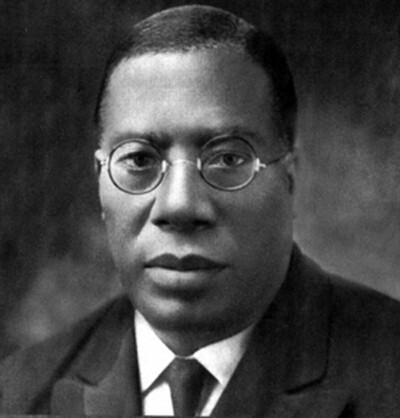St. Paul honored as historic site of Tindley's roots
St. Paul UMC in Berlin, Maryland, was named a United Methodist historic site on June 5 during a worship service at the Peninsula-Delaware Conference African American Summit. This status is a unique honor within the denomination.
 The church received this historic designation because of its connection with the life of the famed preacher and hymn writer, the Rev. Charles Tinley, who was born in Berlin in 1851.
The church received this historic designation because of its connection with the life of the famed preacher and hymn writer, the Rev. Charles Tinley, who was born in Berlin in 1851.
Creston Long, chair of the Pen-Del Commission on Archives and History, offers some insights into the life and ministry of this extraordinary man.
The Rev. Dr. Charles A. Tindley was born near Berlin on July 7, 1851, the son of enslaved father Charles, and free mother Hester. Even though he was born free, his father hired him out to work in the fields.
After the Civil War, Tindley relocated to Philadelphia where he found work carrying bricks. He taught himself to read and write. He and his wife Daisy (Henry) attended Bainbridge St. Methodist Episcopal Church, where later he became the sexton, a job with no salary.
Sensing God’s call to the ministry, Tindley began to retrieve the sermon notes the pastor left in the trash and preached them in African American congregations.
He became a local pastor and enrolled in the course of study. He taught himself Greek and found a rabbi to teach him Hebrew to meet the educational requirement for ordination. Tindley pastored churches in Cape May, NJ; Fairmount and Pocomoke, MD, and at Odessa and at Ezion churches in Wilmington DE. He was the district superintendent of the Wilmington District of the Delaware Conference, before being appointed to Bainbridge M.E. Church in Philadelphia -- the church where he had once been the janitor.
Under Tindley’s leadership, Bainbridge grew rapidly from the 130 members it had when he arrived. Sensing they would soon outgrow their building the congregation purchased a former Presbyterian Church, which seated 900, to accommodate their growing membership.
By 1920 it was clear they needed a larger sanctuary, and they erected a 3,200-seat sanctuary on South Broad Street. Against Tindley protests, the congregation named it Tindley Temple.
 Tindley took an active role in the betterment of the people in his community and worked to end discrimination and injustice. He enlisted business leaders to assist his members in finding jobs. He also encouraged members to start their own businesses and purchase homes. The congregation formed a building and loan association to offer mortgages and he solicited donations of food from businessmen for the feeding of the poor and needy. He protested events that he considered degrading such as the Soap Box Minstrels. In 1915, Tindley and other community leaders led protesters in a march to the theater where D.W. Griffiths's film The Birth of a Nation was to be shown. They were attacked by whites with clubs, sticks and bottles.
Tindley took an active role in the betterment of the people in his community and worked to end discrimination and injustice. He enlisted business leaders to assist his members in finding jobs. He also encouraged members to start their own businesses and purchase homes. The congregation formed a building and loan association to offer mortgages and he solicited donations of food from businessmen for the feeding of the poor and needy. He protested events that he considered degrading such as the Soap Box Minstrels. In 1915, Tindley and other community leaders led protesters in a march to the theater where D.W. Griffiths's film The Birth of a Nation was to be shown. They were attacked by whites with clubs, sticks and bottles.
Under Tindley’s leadership, the membership of Tindley Temple grew to 12,500 and, at his death in 1933, it was the largest Methodist congregation in the world.
Tindley was revered for being a captivating preacher. In his lifetime, he was known as the Prince of Preachers, and because of his songs and hymns, he is also recognized as one of the Founding Fathers of Gospel Music. He wrote more than 50 Gospel songs, including five hymns that are in the United Methodist hymnal.
One of the most famous Tindley hymns was Stand By Me. It goes:
“When the storms of life are raging, stand by me
When the storms of life are raging, stand by me
When the world is tossing me. Like a ship upon the sea.
Thou Who rulest wind and water, Stand by me."
Tindley had deep personal knowledge of what he wrote. The storms of Tindley’s life included being born to an enslaved father, not receiving any formal education, the constant fear in childhood of being captured and sold into slavery in the deep South; dealing constantly with racism and discrimination, the death of two of his children in childhood, the struggle to get a mortgage to buy the former Presbyterian church, and the higher interest that his congregation was charged and the other challenges they faced because they were black. He lived through some storms. God was faithful then. And God is faithful still.

The information on Rev. Tinley brought back past memories. Some years ago my husband sang in an a capella group called the Maryland Heritage Vocal Ensemble under the the direction of William Biehl, the group 's founder. They produced a CD called Hear the Music of the Chesapeake which included their Rev Tinley Gospel Medlly of songs. William Biehl was a major contributor to a boo. Musical Maryland published by the Johns Hopkins University Press in 2017. 0n page 165 is an article on Rev Tindley called Thr Eastern Shore's Gift to Gospel Music. My husband and I are members of Hunt's Memorial United Methodist Church in Towson area of Baltimore County. Thank you for highlighting Rev Tindley and his historical connection to Berlin.